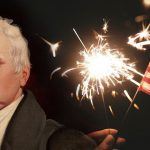Sally Quinn won’t return my emails. Perhaps Quinn, the doyenne of Washington, D.C., and the widow of the Washington Post legend Ben Bradlee, is overwrought. As she recently lamented in The New York Times, her city is under siege:
This spring Washington is a city in crisis. Physically, emotionally, psychologically and spiritually. It’s as if the fragrant air were permeated with an invisible poison, as if we were silently choking on carbon monoxide. The emotion all around—palpable in the streets, the shops, the restaurants, in business offices, at dinner tables—is fear. People have gone from greeting each other with a grimace of anguish as they spout about the outrage of the day to a laugh to despair. It’s all so unbelievable that it’s hard to process, and it doesn’t stop.
Nobody feels safe. Nobody feels protected. This is a city where people seek and, if it all goes well for them, wield power. But today in Washington, those who hold—or once held—the most power are often the most scared. It is not something they are used to feeling. I lived through the paranoia and vengefulness of Watergate. This time in Washington, it’s different. Nobody knows how this will end and what will happen to the country. What might happen to each of us.
The kind of ersatz fear Quinn is describing sounds like the actual terror I experienced in 2018, when The Washington Post, her newspaper, tried to destroy me—and turned the city I was born in and love into a horror movie. At the time I reached out to Quinn, for whom I had written several articles when she was editing the “On Faith” section of the Post. I needed some help salvaging my reputation after I was accused by Christine Blasey Ford of being a witness to Brett Kavanaugh’s alleged assault of her. I emailed Quinn and asked her why the Post was not making available to the public the dozens of articles I had written for the paper in the 1990s—pieces about art, music, religion, and a full-page profile of the historic Howard Theatre. The media was a cyclone of activity and wanted to know everything about me. The Post ran story after corrosive story slandering me. So why not produce what I had written for them and for Quinn? Why bury my work?
Quinn never replied. The pieces I had written for her “On Faith” section were gone. The only one I could find was reproduced in Bill Bennett’s compendium The Book of Man.
Quinn has all kinds of “resistance” courage now, but she had none when it mattered. In 2018, I was swept up in a nightmare when the Supreme Court nominee Brett Kavanaugh was accused of having committed sexual assault at a 1982 high school party. His accuser, Christine Blasey Ford, claimed I was in the room when it happened. The Post broke the story. The reporter, Emma Brown, failed to mention that there was an exonerating witness, Leland Keyser. Ford claimed that Keyser was at the party where the assault took place, but Keyser denied being at any such party and said she didn’t even know Kavanaugh. Though Emma Brown knew of Keyser, she left these details out of the story. Kimberly Strassel of The Wall Street Journal noticed this, asking on Twitter: why is there no mention of Leland Keyser in the piece?
Brown originally contacted me on July 11, 2018—one day after her first meeting on California with Ford. In a cheery email, Brown said she was doing a story on what made Georgetown Prep, the Jesuit school Kavanaugh and I attended, “special.” There was no mention of Ford. The fix was in.
The entire thing was a set-up, which I describe in detail in my book The Devil’s Triangle. The Post refused to review or even discuss the book, which is a Washington book by a Washingtonian about his life growing up in Washington and his involvement in one of the biggest Washington political dramas of the last several years. As I describe in the book, the Post’s coverage of the story was execrable. On October 22, 2018, the paper ran a piece with this headline: “A writer mined his ’80s adolescence in the D.C. suburbs. Then came the Kavanaugh hearings.” The article, by Rebecca Nelson, is a profile of Mike Sacks, a comedy writer who grew up in Maryland. Sacks had a lot of slanderous and libelous things to say about me, Brett Kavanaugh, and our friends, despite the fact that he didn’t know any of us. Sacks once tweeted, “I wrote about Brett Kavanaugh and Mark Judge and their type in my new book. I didn’t. But I did. If that makes sense. Maryland!!!” In her piece, Nelson offers this astonishing admission:
For the record, Sacks didn’t go to Georgetown Prep in Bethesda, the school Kavanaugh and Judge attended. He went to public school. He didn’t belong to a country club, just the neighborhood pool. But growing up in Montgomery County, he says he spent time with “this entitled type,” as he referred to Kavanaugh. “Things had a tendency to happen while you were around them,” he says. “When they got drunk, all bets were off.”
Quoting a man who has never met me or Brett Kavanaugh implying we were drunks and that “things had a tendency to happen” when people were around us and that “all bets were off” when we were drinking is slander and libel.
Then there was the hit piece by Avi Selk. “What the man accused of being part of Kavanaugh’s alleged sexual assault had to say about women’s sexuality,” also published in The Washington Post, is an attempt to smear me as advocating violence against women:
Judge has written dozens of columns in the decades since, including several for this newspaper. Femininity, masculinity and sexuality are perennial themes. He has written that disposable razors are too feminine, that former president Barack Obama is practically a woman, and that gay men have infiltrated the priesthood.
Shortly after the article was published, Selk went on MSNBC and spoke with the anchor Ali Velshi, who asked, “He’s a guy who has written a lot about women, and he has expressed what he thinks women’s role in society is. What’s the Cliffs Notes version of this?” Selk responded:
The Cliffs Notes is he’s never used the words, but he’s the type of person that are sometimes referred to disparagingly as men’s rights activists. He writes about his notion of femininity and masculinity, whereas masculinity is like a man being a man, that quote about unbridled male passion, he’s a fan of, you know, movie scenes of guys, you know, violently taking women and doing things to them.
Then there is the former Post editor Marty Baron. Baron spends a good part of his 2023 book Collision of Power writing about the Kavanaugh nomination. He mentions me when he cites a letter that Ford had written saying that Kavanaugh “with the assistance of his close friend, Mark G. Judge,” had been involved in her assault. Had Baron read my book or the columns I’ve written, he would know that even something as small as Ford referring to me as “Mark G. Judge” is a tell. Mark G. Judge was a byline I used when I was a younger journalist. That Ford would use it in the letter suggests opposition research, not that she was referring to someone she actually knew. It’s a small detail, maybe overwhelmed by Ford’s inability to remember the when or where of the alleged attack, but it is something Woodward and Bernstein would have noticed.
In my book I reveal the opposition researchers Ford was working with, demonstrate that the idea that she was a “reluctant witness” is a lie, and take The Washington Post’s coverage apart piece by piece. Baron, like Sally Quinn, does not have the integrity to mention a single article I have written. He does not mention my book. He does heap praise on Emma Brown, the Post reporter who broke the Ford story. Baron writes: “The Post’s reporter, Emma Brown, had focused single-mindedly on getting the facts right and checking out Ford’s account as best she could under the circumstances at the time.”
The piece I wrote for Sally Quinn that survives in The Book of Man is about growing up in Washington. I was born in D.C. My grandfather was a great first baseman for the Washington Nationals, and my father was an editor at National Geographic. My brother once won the Helen Hayes Award, given to the best actor in Washington, D.C. The Spectator once called me “the city incarnate.” For three summers I taught a journalism class at Georgetown University. I love the city, from the heavily Catholic “Little Rome” of Brookland to the jazz history of Shaw to the Eastern Shore beaches where D.C. decamps in the summer to, yes, Sally Quinn’s Georgetown, where my friends and I partied and danced and fell in love in the 1980s.
These places all became vortices of fear in 2018, as reporters hunted me to the beach; went through my car when I wasn’t there; harassed old girlfriends and vulnerable, elderly loved ones; and left notes under the doors of my siblings. At one point, I drove by the PO box I have in Georgetown to pick up business mail. There was a photographer, pacing back and forth, waiting for me. Sally Quinn, who holds her cocktail parties blocks away, was silent. She doesn’t know what real fear is—and I hope to God she never finds out.
When I was twelve, my father took me to see All the President’s Men. It was a profound influence. I got my start in journalism in high school at Georgetown Prep, where I was friends with Kavanaugh. In the 1980s I began writing for the Washington City Paper, a weekly showcase for young journalists doing long-form literary pieces. I covered subjects from radical teachers to punk zine editors to Sam Lacy, a legendary black sportswriter. In 1990 I won a Dateline journalism award for my story “Safe at Home,” about my grandfather’s baseball career in the 1920s, including the 1924 World Series, and his 1990 induction into the Hall of Stars at RFK Stadium. The article became my 2004 book Damn Senators.
By the late 1980s my writing had come to the attention of editors at the Post—specifically, David Ignatius in the “Outlook” section. I wrote several pieces for “Outlook” about the history, culture, and politics of the city that is in my blood. I wrote about the history of the Howard Theatre, a famed black cultural institution. I wrote about giving up television for Lent. I wrote about jazz music, which I listened to regularly at Blues Alley.
I broke away from the Post in the mid-1990s when they made a change in a piece I wrote and didn’t tell me until it was too late to fix. They made the meaning of my editorial more left-wing without my permission.
Recently, I confronted a New York Times reporter about that paper’s own abysmal 2018 Kavanaugh coverage. “I’ve spent a lot of time thinking about my role in the Kavanaugh coverage,” David Enrich told me, “and I would be happy to talk to you about it at some point. For now, I will just say that I have learned some lessons and would probably do certain things differently next time.” If only Sally Quinn had such courage.


















